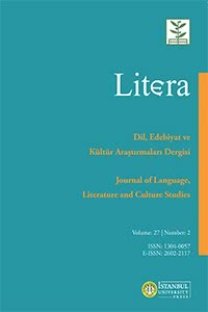WHO IS THE OTHER? MELTING IN THE POT IN ELIF SHAFAK’S THE SAINT OF INCIPIENT INSANITIES AND THE BASTARD OF ISTANBUL
Bu makale, Elif Şafak’ın, her ikisi de A.B.D ve Türkiye’de geçen ve göçmenlik ve kültürler arası geçişkenlik konularına odaklanan Araf ve Baba ve Piç adlı romanlarında vatan, ulus ve kimlik kavramlarının mutlak sınırlarının sorgulanışını incelemektedir. Araf, Boston’da çeşitli ülkelerden gelen bir grup öğrenci arasındaki iletişim ve ilişkileri, özellikle de Türk bir yüksek lisans öğrencisi olan Ömer ve sonradan Ömer’le evlenen ve onun ailesini ziyaret etmek için gittikleri İstanbul’da, kendi deyimiyle ‘aradakalmışlığın en mükemmel örneği’ olan Boğaz Köprüsü’nden atlayarak intihar eden sıradışı, manik depresif Yahudi-Amerikalı Gail arasındaki ilişkiyi konu alır. Baba ve Piç te ise biri Türk diğeri Ermeni-Amerikalı iki aileden dört kuşak kadının aile geçmişlerinin, özellikle Kazancı ve Çakmakçıyan ailelerinin en genç kuşak kadınları olan Asya ve Armanuş’un, geçmişleri ve kimliklerini ararken, Armanuş’un gizli İstanbul seyahati sırasında geliştirdikleri arkadaşlık ve diyaloglar ile birbirine bağlanışı anlatılır. Sadece geçmişin anıları değil, geçmişin izlerini hem silmeye hem de canlı tutmaya yarayan çeşitli objeler, imgeler, hatta ilişkiler, her iki romanda ve bu makalede önemli bir rol oynamaktadır. Bu makale, geçmiş ve şimdi arasında kurulan bağlantıların muğlak ve paradoksal öğeleri olan bu objeler ve sembollerin, tarih ve kimlik kavramlarının mutlaklığını sorgulamakta, değişkenliğini vurgulamakta olduğunun altını çizmektedir. Aslında, Araf romanının en önemli metaforlarından olan ve Gail’in oynamaktan hoşlandığı ‘alfabe çorbası’nın harf ya da malzemelerine sürekli yeni şekiller vermekten oluşan çocukluk oyunu da aynı işlevi görmektedir. Romandaki karakterlerin bireysel ve toplumsal kimlikleri, ayrıca sürekli değişmekte ve yeniden şekillenmekte olan aidiyetleri arasındaki çözülemeyen çelişki ve gerilimler, ulusal ve etnik kimlik üzerine hakim söylemleri ve onların dayandığı ‘ötekilik’ kavramını sorgulamaktadır.
WHO IS THE OTHER? MELTING IN THE POT IN ELIF SHAFAK’S THE SAINT OF INCIPIENT INSANITIES AND THE BASTARD OF ISTANBUL
This article explores the ways in which Elif Shafak’s novels The Saint of Incipient Insanities and The Bastard of Istanbul, which are set both in Turkey and the US and centered on the themes of ‘migrancy’ and ‘transculturalism’ interrogate and undermine the essentialized boundaries of ‘home’, ‘nation’ and ‘identity’. The Saint of Incipient Insanities revolves around the interactions of a group of international students in Boston, mainly the relationship between Ömer, a graduate student from Turkey, and Gail, the eccentric, manic-depressive Jewish-American girl who later becomes Ömer’s wife but commits suicide by jumping from the Bosphorus Bridge, “the perfect place of inbetweendom” in her words, when they visit Ömer’s family in Istanbul. In The Bastard of Istanbul the family histories of four generations of Turkish and Armenian (-American) women become intertwined, as the novel describes how the members of Kazancı and Tchakmakhchian families, especially Asya and Armanoush, the youngest generation of women of the two families try to come to terms with their past and identity, particularly as they develop a friendship and dialogue in Istanbul during Armanoush’s secret visit. Not only the memories of the past but also the objects, images and relationships that simultaneously efface and re inscribe the traces of the past constitute a significant aspect of the novel as well as this article which arguesthat the ambiguous part such objects, images and relationships play in establishing links between the past and the present destabilize monolithic conceptions of history and identity. So does the central metaphor of The Saint of Incipient Insanities, which inspired the title of this article, namely a childhood game Gail likes playing, in which she can combine and re-combine in endless configurations the letters or ingredients of the ‘alphabet soup’ in her Bowl of Eden. It is, however, in the unresolved tensions between the characters’ individual and collective identities and between their multifarious allegiances that the totalizing discourses on nation, ethnicity, and identity, as well as the concept of ‘otherness’ that such discourses rest on are called into question
___
Antze, Paul and Michael Lambek, eds. Tense Past: Cultural Essays in Trauma and Memory. New York: Routledge, 1996.Brah, Avtar. Cartographies of Diaspora: Contesting Identities. London: Routledge, 1996.
Bryan Cheyette, “Diasporas of the Mind: British-Jewish Writing Beyond Multiculturalism,” in Diaspora and Multiculturalism: Common Traditions and New Developments, ed. Monika Flaudernik (Amsterdam: Rodopi, 2003): 45-82.
Deleuze, Gilles and Félix Guattari. A Thousand Plateaus: Capitalism and Schizophrenia.
Minneapolis: University of Minnesota Press, 1984).
Eagleton, Terry. The Idea of Culture. Oxford: Blackwell, 2000.
Gilman, Sander. The Jew’s Body. London & New York: Routledge, 1991.
Kristeva, Julia. Strangers to Ourselves. New York: Columbia University Press, 1994.
Rose, Gillian. Judaism and Modernity: Philosophical Essays. Oxford: Blackwell, 1993.
Shafak, Elif. The Bastard of Istanbul. New York: Penguin Books, 2007
The Saint of Incipient Insanities. New York: Farrar, Straus and Giroux, 2004
- Yayın Aralığı: Yılda 2 Sayı
- Yayıncı: İstanbul Üniversitesi
